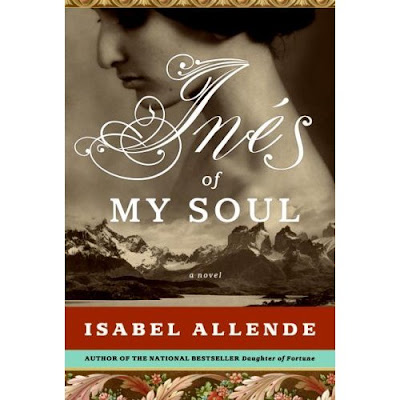Author: Isabel Allende
Publisher: HarperCollins Rayo
ISBN 13: 978-0061161537
I’m a Chicana. I am a Danzante Azteca, an Aztec Dancer. To me, all conquistadors were monsters. I’ve hated them, Hernan Cortez in particular for as long as I can remember. I knew nothing about the conquistadores of Chile, nor did I care to. I knew all I wanted to about the conquistadores, their brutality, the violence and genocide done to my people 500 years ago. I knew all I wanted to and that was the end of it. Or so I thought.
I took my time about reading Inés of My Soul. I wanted to read it, it sat in my shelf for more than a month but something always stopped me. Then one day as I was getting ready for work, I picked it up and turned the page. That was it for me. Needless to say, I never did make it in to work that day. I stayed in my room and read Inés’ story until I finished the book. Then I read it again.
Isabel Allende has that effect on me. Her books make me think, make me absorb them, take them in until the words almost become part of my DNA. I am always in awe of her writing, always amazed and always, always transfixed and held captive in her world of words. Inés of My Soul did that to me. Not only that, it did something bigger. Huge. Inés of My Soul was an epiphany for me. It made me think of the conquistadores in a radically different way. It made me see their humanity. Los Conquistadores human? That they had beliefs, loves, losses, dreams and hopes. Wow. It had never before entered my mind that they would have feelings. To me, they were just the monsters that came, stole, raped and pillaged. I never once considered that they were human beings. I still think they were wrong and I still believe they were murderers and rapists. The only change was that I know see their humanity.
Inés of My Soul is the story of Doña Inés Suárez (1507– 1580), a poor seamstress in Spain who goes to Peru to track down her cheating husband only to find that he has died in battle and then goes on to become the first lady of Chile. In this grand historical fiction, she is writing her memoirs in the year of her death. She tells of her girlhood in Spain, of her love for the cheating husband Juan de Málaga “one of those handsome, happy men no woman can resist at first, but later wishes another woman would win away because he causes so much pain” and of her decision to stay in Peru. She travels, she fights, becomes a nurse to the wounded, even fights in battle against various indigenous tribes. There are bloody and vicious battles, romance, cruelty, trials and tribulations.
Inés then falls in love with Pedro de Valdivia and travels with him to Chile where they set about conquering the land and making a home there. She tells her stepdaughter from her second marriage, “I beg you to have a little patience, Isabel. You will soon see that this disorderly narrative will come to the moment when my path crosses that of Pedro de Valdivia and the epic I want to tell you about begins. Before that, I had been an insignificant seamstress in Plasencia, like the hundreds and hundreds of hardworking women who came here before and will come after me. With Pedro de Valdivia I lived a life of legend, and with him I conquered a kingdom. Although I adored Rodrigo de Quiroga, your father, and lived with him thirty years, the only real reason for telling my story is the conquest of Chile, which I shared with Pedro de Valdivia.”
It’s an amazing story and a book I find myself picking up again and again. I found myself really liking Inés even when I was horrified at her brutality.






